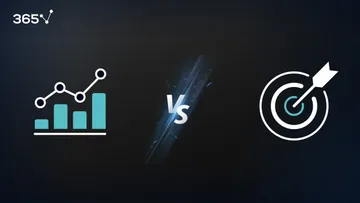
What is the difference between a data analyst and a business analyst?
In smaller companies, the job titles are sometimes interchangeable, and both describe roles that involve analyzing data and systems. However, bigger organizations employ data analysts and business analysts to do one-of-a-kind tasks, which makes the difference between the two quite important to understand.
So, if you are just getting started, or transitioning from an unrelated field, this post will help you determine which job role suits you best and decide which career path to take.
Data Analyst vs Business Analyst: What Do They Do?
What Does a Data Analyst Do?
The fundamental job of a data analyst is to tell enthralling stories with data that empower company leaders to make more informed, and better decisions. The data analyst responsibilities often include:
- Design and maintenance of databases and data systems, which includes troubleshooting possible problems.
- Preparing reports that communicate findings effectively to the major stakeholders and company leaders.
- Mining and cleaning data for analysis preparation.
What Does a Business Analyst Do?
A business analyst uses data to inform calculated strategic business decisions. Moreover, business analysts could also hold job titles including management analyst, operations research analyst, or business data analyst. The typical duties of a business analyst include:
- Communicating insights with key stakeholders and business teams.
- Evaluating processes for cost, efficiency, as well as other valuable metrics.
- Preparing judicious recommendations for procedures, process adjustments, and performance enhancements.
Data Analyst vs Business Analyst: Role Requirements
How to Become a Data Analyst: Education Requirements
A Bachelor’s Degree in a related field is typically required for entry-level positions. Managers nonetheless strongly opt for applicants who have a Graduate Degree, like a Master’s Degree in Analytics for senior jobs. Furthermore, a Bachelor’s Degree in a field that has an emphasis on Analytical and Statistical Skills, such as Mathematics or Computer Science will certainly give you a competitive edge.
How to Become a Business Analyst: Education Requirements
The standard is a Bachelor’s or a Master’s degree. Relevant fields of study include Business, Business Administration, Accounting, Management, Economics, Marketing, Computer and Information Science, as well as Statistics. You could also go for voluntary certifications, which are widely available now. Supplementing your education with computer science, and data science courses will certainly benefit your career.
Data Analyst Skills: What Skills Does a Data Analyst Need?
Creative thinking and Analytical thinking
Simply put, a good analyst should be creative and curious. You should not only have a robust ground in statistical methods, but also a critical mindset. Those will enable you to solve issues through an analytical and creative lens.
Programming Skills
A data analyst is usually proficient in a specific programming language and has a working knowledge of others as well. Typically, analysts use languages like SQL, Python, and R for gathering and cleaning data, visualization of data, and statistical analysis.
Data Visualization Skills
Trial and error are required for effective data visualization. A successful analyst comprehends what graphs should be used, should be knowledgeable in scaling visualizations, and know which charts will best represent the data.
Effective and Strong Communication Skills
A data analyst should be able to convey findings clearly, whether to an audience or readers, or a small team of executives. The key to your success is strong communication skills.
Business Analyst Skills: What Skills Does a Business Analyst Need?
Communication Skills
First things first. You should be an excellent communicator to become a business analyst. That means you should be master of facilitating working meetings, listening to answers, asking good questions, and absorbing all that’s being said. In today’s world, communication doesn’t need to be face-to-face all the time.
Therefore, you have to be a strong communicator in a virtual scenario as well.
Technical Skills
In general, business analysts should be well-versed in SQL, Power BI, Tableau, and Microsoft Excel, among other software. Furthermore, they should have a working knowledge of the technology in analytics. Nevertheless, the need for hard tech skills, in general, is lower compared to data analysts.
So, if you want to advance your business analyst career, the remarkable market differentiator is to develop an advanced knowledge of mathematics, computer science, and data analytics.
Problem-Solving Skills
All projects encounter some problems. As a matter of fact, an entire project, in its essence, is a solution to an issue. At the topmost level, business analysts facilitate a shared comprehension of a problem, the solutions possible, as well as determine the project’s scope. You’ll also find business analysts in the middle of facilitating teams to resolve technical problems, especially when they involve negotiation between several technology stakeholders and organization.
Critical Thinking
It is the responsibility of a business analyst to evaluate a few alternatives before helping the team settle for one solution. When trying to determine the issue that should be resolved, a qualified business analyst should listen to the requirements of the stakeholder, consider those, and ask probing questions until the real need emerges and is understood. This is what makes evaluation and critical thinking skills paramount to new business analysts.
Data Analyst vs Business Analyst: Salary Comparison
A Data Analyst Salary: How Much Does a Data Analyst Make?
According to Glassdoor data, if you’re 1-3 years into your data analyst career, you can expect an average annual pay of $55,000.
As you reach 4-6 years of experience, your compensation will also go higher ($62,000 median annual salary).
A Business Analyst Salary: How Much Does a Business Analyst Make?
If you’re new to the role (with 1 to 3 years of experience), you can count on \$59,000 average pay. Once you’ve spent more time on the job, your median annual pay can reach \$69,000.
Data Analytics vs Business Analytics: Which Career Path Is Right for You?
Should you go for a data analyst job, or a business analyst job? If you are trying to weigh your options, consider the following factors:
- Educational and professional background
- Interests
- Desired career path
Both roles would enable you to capitalize on your fondness and love of ‘all things data’. Furthermore, both would appeal to your rapport in problem solving. Both careers also would perfectly work in tandem with in-depth data science knowledge.
The business analyst and data analyst roles, however, require varying focuses and sets of skills, which make it necessary to carefully choose your path. Fortunately, there are plenty of industries, such as consulting or software development with lots of opportunities for both business and data analysts.
It’s truly all up to you to decide, and we hope this article will help you embark on the right career path. If data analyst is your choice, our Data Analyst Cover Letter Sample might come in handy for you. And, if you already have knowledge in the fields of Data Analytics, you can prepare with Data Analyst Interview Questions and Answers.
How to Prepare for a Data Analyst or a Business Analyst Role?
If you’re considering a career in data analytics or business analytics, check out the complete Data Science Program today. Start with the fundamentals with our Statistics, Maths, and Excel courses. Build up a step-by-step experience with SQL, Python, R, Power BI, and Tableau. And upgrade your skillset with Machine Learning, Deep Learning, Time Series Analysis, Business Analytics, and Customer Analytics in Python. Still not sure you want to turn your interest in data science into a career? You can explore the curriculum or sign up for 15 hours of beginner to advanced video content for free by clicking on the button below.







